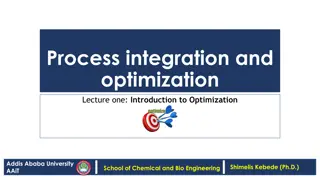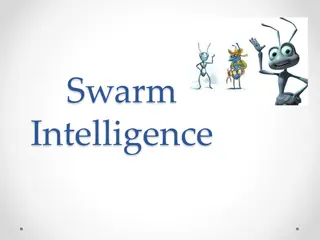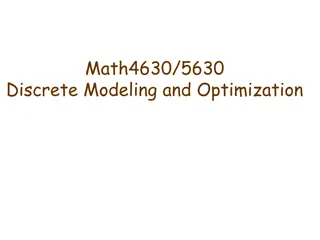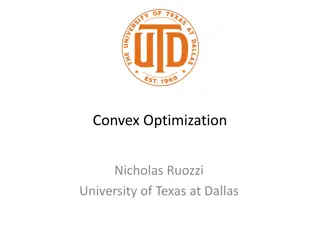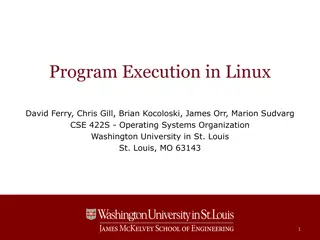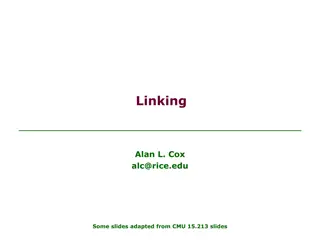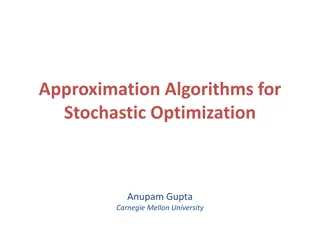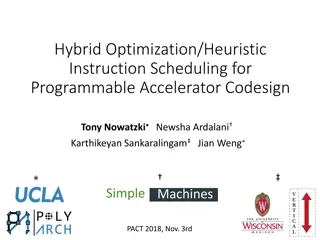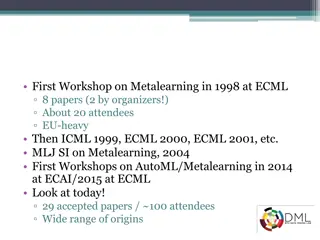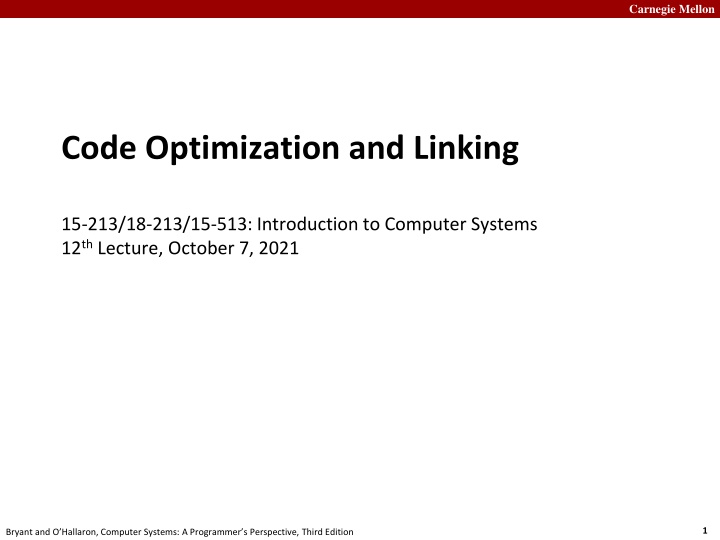
Carnegie Mellon Computer Systems Lecture Highlights
Dive into the world of computer systems with insights from Carnegie Mellon's lecture series, covering topics like code optimization, linking, compiler basics, and the history of programming pioneers like Grace Hopper and John Backus.
Download Presentation

Please find below an Image/Link to download the presentation.
The content on the website is provided AS IS for your information and personal use only. It may not be sold, licensed, or shared on other websites without obtaining consent from the author. If you encounter any issues during the download, it is possible that the publisher has removed the file from their server.
You are allowed to download the files provided on this website for personal or commercial use, subject to the condition that they are used lawfully. All files are the property of their respective owners.
The content on the website is provided AS IS for your information and personal use only. It may not be sold, licensed, or shared on other websites without obtaining consent from the author.
E N D
Presentation Transcript
Carnegie Mellon Code Optimization and Linking 15-213/18-213/15-513: Introduction to Computer Systems 12thLecture, October 7, 2021 1 Bryant and O Hallaron, Computer Systems: A Programmer s Perspective, Third Edition
Carnegie Mellon Today Basics of compiler optimization Principles and goals Some example optimizations Obstacles to optimization Linking: combining object files into programs Symbols and symbol resolution Relocation Static libraries Quiz If we have time Branch prediction Dynamic libraries 2 Bryant and O Hallaron, Computer Systems: A Programmer s Perspective, Third Edition
Carnegie Mellon What does it mean to compile code? The CPU only understands machine code directly All other languages must be either interpreted: executed by software compiled: translated to machine code by software 3 Bryant and O Hallaron, Computer Systems: A Programmer s Perspective, Third Edition
Carnegie Mellon There s a story that starts like this: Back in the Good Old Days, when the term "software" sounded funny and Real Computers were made out of drums and vacuum tubes, Real Programmers wrote in machine code. Not FORTRAN. Not RATFOR. Not, even, assembly language. Machine Code. Raw, unadorned, inscrutable hexadecimal numbers. Directly. The Story of Mel, a Real Programmer Ed Nather, 1983 4 Bryant and O Hallaron, Computer Systems: A Programmer s Perspective, Third Edition
Carnegie Mellon Rear Admiral Grace Hopper Invented first compiler in 1951 (technically it was a linker) Coined compiler (and bug ) Compiled for Harvard Mark I Eventually led to COBOL (which ran the world for years) I decided data processors ought to be able to write their programs in English, and the computers would translate them into machine code 5 Bryant and O Hallaron, Computer Systems: A Programmer s Perspective, Third Edition
Carnegie Mellon John Backus Led team at IBM invented the first commercially available compiler in 1957 Compiled FORTRAN code for the IBM 704 computer FORTRAN still in use today for high performance code Much of my work has come from being lazy. I didn't like writing programs, and so, when I was working on the IBM 701, I started work on a programming system to make it easier to write programs 6 Bryant and O Hallaron, Computer Systems: A Programmer s Perspective, Third Edition
Carnegie Mellon Fran Allen Pioneer of many optimizing compilation techniques Wrote a paper simply called Program Optimization in 1966 This paper introduced the use of graph-theoretic structures to encode program content in order to automatically and efficiently derive relationships and identify opportunities for optimization First woman to win the ACM Turing Award (the Nobel Prize of Computer Science ) 7 Bryant and O Hallaron, Computer Systems: A Programmer s Perspective, Third Edition
Carnegie Mellon Goals of compiler optimization Minimize number of instructions Don t do calculations more than once Don t do unnecessary calculations at all Avoid slow instructions (multiplication, division) Avoid waiting for memory Keep everything in registers whenever possible Access memory in cache-friendly patterns Load data from memory early, and only once Avoid branching Don t make unnecessary decisions at all Make it easier for the CPU to predict branch destinations Unroll loops to spread cost of branches over more instructions 8 Bryant and O Hallaron, Computer Systems: A Programmer s Perspective, Third Edition
Carnegie Mellon Limits to compiler optimization Generally cannot improve algorithmic complexity Only constant factors, but those can be worth 10x or more Must not cause any change in program behavior Programmer may not care about edge case behavior, but compiler does not know that Exception: language may declare some changes acceptable Usually only analyze one function at a time Whole-program analysis is usually too expensive Exception: inlining merges many functions into one Cannot anticipate run-time inputs Worst case performance can be just as important as normal Especially for code exposed to malicious input (e.g. network servers) 9 Bryant and O Hallaron, Computer Systems: A Programmer s Perspective, Third Edition
Carnegie Mellon Compilation is a pipeline Preprocessing Eliminate common subexpressions Fold constants Inline functions Restructure loops Move code out of loops Reduce control flow to gotos Compilation Reduce operation strength Eliminate dead code Select instructions Schedule instructions Allocate registers Emit assembly language Assembling 10 Bryant and O Hallaron, Computer Systems: A Programmer s Perspective, Third Edition
Carnegie Mellon Two kinds of optimizations entry Local optimizations work inside a single basic block Constant folding, strength reduction, (local) CSE, setup Easy? Global optimizations process the entire control flow graph of a function Loop nest optimization, code motion, (global) CSE, dead code elimination, easy complex loop Done? exit 11 Bryant and O Hallaron, Computer Systems: A Programmer s Perspective, Third Edition
Carnegie Mellon Constant Folding Do arithmetic in the compiler long mask = 0xFF << 8; long mask = 0xFF00; Any expression with constant inputs can be folded Might even be able to remove library calls size_t namelen = strlen("Harry Bovik"); size_t namelen = 11; 12 Bryant and O Hallaron, Computer Systems: A Programmer s Perspective, Third Edition
Carnegie Mellon Strength reduction Replace expensive operations with cheaper ones long a = b * 5; long a = (b << 2) + b; Multiplication and division are the usual targets Multiplication is often hiding in memory access expressions 13 Bryant and O Hallaron, Computer Systems: A Programmer s Perspective, Third Edition
Carnegie Mellon Dead code elimination Don t emit code that will never be executed if (0) { puts("Kilroy was here"); } if (1) { puts("Only bozos on this bus"); } Don t emit code whose result is overwritten x = 0; x = 23; These may look silly, but... Can be produced by other optimizations Assignments to x might be far apart 14 Bryant and O Hallaron, Computer Systems: A Programmer s Perspective, Third Edition
Carnegie Mellon Common Subexpression Elimination Factor out repeated calculations, only do them once norm[i] = v[i].x*v[i].x + v[i].y*v[i].y; elt = &v[i]; x = elt->x; y = elt->y; norm[i] = x*x + y*y; 15 Bryant and O Hallaron, Computer Systems: A Programmer s Perspective, Third Edition
Carnegie Mellon Inlining Copy body of a function into its caller(s) Can create opportunities for many other optimizations Can make code much bigger and therefore slower int func(int y) { int pred(int x) { if (x == 0) return 0; else return x - 1; } int tmp; if (y == 0) tmp = 0; else tmp = y - 1; if (0 == 0) tmp += 0; else tmp += 0 - 1; if (y+1 == 0) tmp += 0; else tmp += (y + 1) - 1; return tmp; int func(int y) { return pred(y) + pred(0) + pred(y+1); } } 16 Bryant and O Hallaron, Computer Systems: A Programmer s Perspective, Third Edition
Carnegie Mellon Inlining Copy body of a function into its caller(s) Can create opportunities for many other optimizations Can make code much bigger and therefore slower int func(int y) { int pred(int x) { if (x == 0) return 0; else return x - 1; } int tmp; if (y == 0) tmp = 0; else tmp = y - 1; if (0 == 0) tmp += 0; else tmp += 0 - 1; if (y+1 == 0) tmp += 0; else tmp += (y + 1) - 1; return tmp; int func(int y) { return pred(y) + pred(0) + pred(y+1); } } Always true Does nothing Can constant fold 17 Bryant and O Hallaron, Computer Systems: A Programmer s Perspective, Third Edition
Carnegie Mellon Inlining Copy body of a function into its caller(s) Can create opportunities for many other optimizations Can make code much bigger and therefore slower int func(int y) { int func(int y) { int tmp = 0; int tmp; if (y != 0) tmp = y - 1; if (y == 0) tmp = 0; else tmp = y - 1; if (0 == 0) tmp += 0; else tmp += 0 - 1; if (y != -1) tmp += y; if (y+1 == 0) tmp += 0; else tmp += (y + 1) - 1; return tmp; return tmp; } } 18 Bryant and O Hallaron, Computer Systems: A Programmer s Perspective, Third Edition
Carnegie Mellon Code Motion Move calculations out of a loop Only valid if every iteration would produce same result long j; for (j = 0; j < n; j++) a[n*i+j] = b[j]; long j; int ni = n*i; for (j = 0; j < n; j++) a[ni+j] = b[j]; 19 Bryant and O Hallaron, Computer Systems: A Programmer s Perspective, Third Edition
Carnegie Mellon Loop Unrolling Amortize cost of loop condition by duplicating body Creates opportunities for CSE, code motion, scheduling Prepares code for vectorization Can hurt performance by increasing code size for (size_t i = 0; i < nelts; i++) { A[i] = B[i]*k + C[i]; } for (size_t i = 0; i < nelts - 4; i += 4) { A[i ] = B[i ]*k + C[i ]; A[i+1] = B[i+1]*k + C[i+1]; A[i+2] = B[i+2]*k + C[i+2]; A[i+3] = B[i+3]*k + C[i+3]; } 20 Bryant and O Hallaron, Computer Systems: A Programmer s Perspective, Third Edition
Carnegie Mellon Loop Unrolling Amortize cost of loop condition by duplicating body Creates opportunities for CSE, code motion, scheduling Prepares code for vectorization Can hurt performance by increasing code size for (size_t i = 0; i < nelts; i++) { A[i] = B[i]*k + C[i]; } for (size_t i = 0; i < nelts - 4; i += 4) { A[i ] = B[i ]*k + C[i ]; A[i+1] = B[i+1]*k + C[i+1]; A[i+2] = B[i+2]*k + C[i+2]; A[i+3] = B[i+3]*k + C[i+3]; } When would this change be incorrect? 21 Bryant and O Hallaron, Computer Systems: A Programmer s Perspective, Third Edition
Carnegie Mellon Scheduling Find the CPU something useful to do while it s waiting for memory, division unit, etc. Extremely machine-dependent, but here s a basic example: for (size_t i = 0; i < nelts - 4; i += 4) { A[i ] = B[i ]*k + C[i ]; A[i+1] = B[i+1]*k + C[i+1]; A[i+2] = B[i+2]*k + C[i+2]; A[i+3] = B[i+3]*k + C[i+3]; } for (size_t i = 0; i < nelts - 4; i += 4) { B0 = B[i]; B1 = B[i+1]; B2 = B[i+2]; B3 = B[i+3]; C0 = C[i]; C1 = C[i+1]; C2 = C[i+2]; C3 = B[i+3]; A[i ] = B0*k + C0; A[i+1] = B1*k + C1; A[i+2] = B2*k + C2; A[i+3] = B3*k + C3; } 22 Bryant and O Hallaron, Computer Systems: A Programmer s Perspective, Third Edition
Carnegie Mellon Scheduling Find the CPU something useful to do while it s waiting for memory, division unit, etc. Extremely machine-dependent, but here s a basic example: for (size_t i = 0; i < nelts - 4; i += 4) { A[i ] = B[i ]*k + C[i ]; A[i+1] = B[i+1]*k + C[i+1]; A[i+2] = B[i+2]*k + C[i+2]; A[i+3] = B[i+3]*k + C[i+3]; } for (size_t i = 0; i < nelts - 4; i += 4) { B0 = B[i]; B1 = B[i+1]; B2 = B[i+2]; B3 = B[i+3]; C0 = C[i]; C1 = C[i+1]; C2 = C[i+2]; C3 = B[i+3]; A[i ] = B0*k + C0; A[i+1] = B1*k + C1; A[i+2] = B2*k + C2; A[i+3] = B3*k + C3; } When would this change be incorrect? 23 Bryant and O Hallaron, Computer Systems: A Programmer s Perspective, Third Edition
Carnegie Mellon Memory Aliasing /* Sum rows of n X n matrix a and store in vector b */ void sum_rows1(double *a, double *b, long n) { long i, j; for (i = 0; i < n; i++) { b[i] = 0; for (j = 0; j < n; j++) b[i] += a[i*n + j]; } } # sum_rows1 inner loop .L4: movsd (%rsi,%rax,8), %xmm0 addsd (%rdi), %xmm0 movsd %xmm0, (%rsi,%rax,8) addq $8, %rdi cmpq %rcx, %rdi jne .L4 # FP load # FP add # FP store Code updates b[i] on every iteration Why couldn t compiler optimize this away? 24 Bryant and O Hallaron, Computer Systems: A Programmer s Perspective, Third Edition
Carnegie Mellon Memory Aliasing /* Sum rows of n X n matrix a and store in vector b */ void sum_rows1(double *a, double *b, long n) { long i, j; for (i = 0; i < n; i++) { b[i] = 0; for (j = 0; j < n; j++) b[i] += a[i*n + j]; } } Value of B: double A[9] = { 0, 1, 2, 4, 8, 16}, 32, 64, 128}; double A[9] = { 0, 1, 2, { 0, 1, 2, { 0, 1, 2, { 0, 1, 2, { 0, 1, 2, { 0, 1, 2, { 0, 1, 2, { 0, 1, 2, { 0, 1, 2, { 0, 1, 2, double A[9] = double A[9] = double A[9] = double A[9] = double A[9] = double A[9] = double A[9] = double A[9] = double A[9] = double A[9] = { 0, 1, 2, 0, 8, 16}, 1, 8, 16}, 3, 8, 16}, 3, 0, 16}, 3, 3, 16}, 3, 6, 16}, 3, 22, 16}, 3, 22, 0}, 3, 22, 32}, 3, 22, 96}, 3, 22, 224}, double A[9] = { 0, 1, 2, 0, 8, 16}, 32, 64, 128}; 32, 64, 128}; 32, 64, 128}; 32, 64, 128}; 32, 64, 128}; 32, 64, 128}; 32, 64, 128}; 32, 64, 128}; 32, 64, 128}; 32, 64, 128}; 32, 64, 128}; 32, 64, 128}; init: [4, 8, 16] i = 0: [3, 8, 16] i = 1: [3, 22, 16] double B[3] = A+3; i = 2: [3, 22, 224] sum_rows1(A, B, 3); Code updates b[i] on every iteration Must consider possibility that these updates will affect program behavior 25 Bryant and O Hallaron, Computer Systems: A Programmer s Perspective, Third Edition
Carnegie Mellon Removing Aliasing /* Sum rows of n X n matrix a and store in vector b */ void sum_rows2(double *a, double *b, long n) { long i, j; for (i = 0; i < n; i++) { double val = 0; for (j = 0; j < n; j++) val += a[i*n + j]; b[i] = val; } } # sum_rows2 inner loop .L10: addsd (%rdi), %xmm0 addq $8, %rdi cmpq %rax, %rdi jne .L10 # FP load + add Use a local variable for intermediate results 26 Bryant and O Hallaron, Computer Systems: A Programmer s Perspective, Third Edition
Carnegie Mellon Removing Aliasing /* Sum rows of n X n matrix a and store in vector b */ void sum_rows3(double *restrict a, double *restrict b, long n) { long i, j; for (i = 0; i < n; i++) { b[i] = 0; for (j = 0; j < n; j++) b[i] += a[i*n + j]; } } # sum_rows3 inner loop .L12: addsd (%rdi), %xmm0 addq $8, %rdi cmpq %rax, %rdi jne .L12 # FP load + add Use restrict qualifier to tell compiler that a and b cannot alias Less reliable than using local variables 27 Bryant and O Hallaron, Computer Systems: A Programmer s Perspective, Third Edition
Carnegie Mellon Removing Aliasing subroutine sum_rows4(a, b, n) implicit none integer, parameter :: dp = kind(1.d0) real(kind=dp), dimension(:), intent(in) :: a real(kind=dp), dimension(:), intent(out) :: b integer, intent(in) :: n integer :: i, j do i = 1,n b(i) = 0 do j = 1,n b(i) = b(i) + a(i*n + j) end end end # sum_rows4 inner loop .L5: addsd (%rdi), %xmm0 addq $8, %rdi cmpq %rax, %rdi jne .L5 # FP load + add Use Fortran Array parameters in Fortran are assumed not to alias 28 Bryant and O Hallaron, Computer Systems: A Programmer s Perspective, Third Edition
Carnegie Mellon When the compiler can t move something void lower1(char *s) { size_t i; for (i = 0; i < strlen(s); i++) if (s[i] >= 'A' && s[i] <= 'Z') s[i] -= ('A' - 'a'); } void lower2(char *s) { size_t i, n = strlen(s); for (i = 0; i < n; i++) if (s[i] >= 'A' && s[i] <= 'Z') s[i] -= ('A' - 'a'); } 250 200 CPU seconds 150 lower1 100 50 lower2 0 0 50000 100000 150000 200000 250000 300000 350000 400000 450000 500000 String length 29 Bryant and O Hallaron, Computer Systems: A Programmer s Perspective, Third Edition
Carnegie Mellon Today Basics of compiler optimization Principles and goals Some example optimizations Obstacles to optimization Linking: combining object files into programs Symbols and symbol resolution Relocation Static libraries Quiz If we have time Branch prediction Dynamic libraries 30 Bryant and O Hallaron, Computer Systems: A Programmer s Perspective, Third Edition
Carnegie Mellon Example C Program int sum(int *a, int n); int sum(int *a, int n) { int i, s = 0; int array[2] = {1, 2}; int main(int argc, char** argv) { int val = sum(array, 2); return val; } for (i = 0; i < n; i++) { s += a[i]; } return s; } sum.c main.c 31 Bryant and O Hallaron, Computer Systems: A Programmer s Perspective, Third Edition
Carnegie Mellon Linking Programs are translated and linked using a compiler driver: linux> gcc -Og -o prog main.c sum.c linux> ./prog main.c sum.c Source files Translators (cpp, cc1, as) Translators (cpp, cc1, as) Separately compiled relocatable object files main.o sum.o Linker (ld) Fully linked executable object file (contains code and data for all functions defined in main.c and sum.c) prog 32 Bryant and O Hallaron, Computer Systems: A Programmer s Perspective, Third Edition
Carnegie Mellon What Do Linkers Do? Step 1: Symbol resolution Programs define and reference symbols (global variables and functions): void swap() { } /* define symbol swap */ swap(); /* reference symbol swap */ int *xp = &x; /* define symbol xp, reference x */ Symbol definitions are stored in object file (by assembler) in symbol table. Symbol table is an array of entries Each entry includes name, size, and location of symbol. During symbol resolution step, the linker associates each symbol reference with exactly one symbol definition. 33 Bryant and O Hallaron, Computer Systems: A Programmer s Perspective, Third Edition
Carnegie Mellon Symbols in Example C Program Definitions int sum(int *a, int n); int sum(int *a, int n) { int i, s = 0; int array[2] = {1, 2}; int main(int argc, char** argv) { int val = sum(array, 2); return val; } for (i = 0; i < n; i++) { s += a[i]; } return s; } sum.c main.c Reference 34 Bryant and O Hallaron, Computer Systems: A Programmer s Perspective, Third Edition
Carnegie Mellon Linker Symbols Every object file m has a table of symbols it defines or needs. Three types: Global definitions Symbols defined by m that can be referenced by other files. In C, non-static functions and global variables. Local definitions Symbols that are defined by m but cannot be referenced by other files. In C, functions and global variables defined with static. Local linker symbols are not local program variables External references Symbols that m uses but does not define. These must be defined by some other module. 35 Bryant and O Hallaron, Computer Systems: A Programmer s Perspective, Third Edition
Carnegie Mellon Symbol Resolution ??? int sum(int *a, int n); int sum(int *a, int n) { int i, s = 0; int array[2] = {1, 2}; int main(int argc, char** argv) { int val = sum(array, 2); return val; } for (i = 0; i < n; i++) { s += a[i]; } return s; } sum.c main.c 36 Bryant and O Hallaron, Computer Systems: A Programmer s Perspective, Third Edition
Carnegie Mellon Relocation Entries int array[2] = {1, 2}; int main(int argc, char** argv) { int val = sum(array, 2); return val; } main.c 0000000000000000 <main>: 0: 48 83 ec 08 sub $0x8,%rsp 4: be 02 00 00 00 mov $0x2,%esi 9: bf 00 00 00 00 mov $0x0,%edi # %edi = &array a: R_X86_64_32 array # Relocation entry e: e8 00 00 00 00 callq 13 <main+0x13> # sum() f: R_X86_64_PC32 sum-0x4 # Relocation entry 13: 48 83 c4 08 add $0x8,%rsp 17: c3 retq main.o Source: objdump r d main.o 37 Bryant and O Hallaron, Computer Systems: A Programmer s Perspective, Third Edition
Carnegie Mellon Symbol Identification Which of the following names will be in the symbol table of symbols.o? Names: incr foo a argc argv b main printf Others? "%d\n" incr foo a argc argv b main printf symbols.c: int incr = 1; static int foo(int a) { int b = a + incr; return b; } int main(int argc, char* argv[]) { printf("%d\n", foo(5)); return 0; } Can find this with readelf: linux> readelf s symbols.o 38 Bryant and O Hallaron, Computer Systems: A Programmer s Perspective, Third Edition
Carnegie Mellon Local Symbols Local non-static C variables vs. local static C variables Local non-static C variables: stored on the stack Local static C variables: stored in either .bss or .data static int x = 15; int f() { static int x = 17; return x++; } Compiler allocates space in .data for each definition of x Creates local symbols in the symbol table with unique names, e.g., x, x.1721 and x.1724. int g() { static int x = 19; return x += 14; } int h() { return x += 27; } Bryant and O Hallaron, Computer Systems: A Programmer s Perspective, Third Edition static-local.c 39
Carnegie Mellon What if you mess up? Correct program. Only one definition of x, p1, p2 int x=7; p1() {} extern int x; p2() {} int x=7; p1() {} int x=0; p1() {} Link error: two definitions of x and p1 Compiler-dependent. Might be considered either one or two definitions of x. int x; p1() {} int x; p2() {} Undefined behavior. No link error. Writes to x in p2 may overwrite y! int x=7; int y=5; p1() {} extern double x; p2() {} Undefined behavior. No link error. Call to p1 may crash! char p1[] = 0xC3; extern void p1(); p2() { p1(); } Linker checks for two definitions of one symbol. Linker does not check types of references. 40 Bryant and O Hallaron, Computer Systems: A Programmer s Perspective, Third Edition
Carnegie Mellon Type Mismatch Example extern long int x; double x = 3.14; int main(int argc, char *argv[]) { printf("%ld\n", x); return 0; } mismatch-variable.c mismatch-main.c Compiles without any errors or warnings What gets printed? 41 Bryant and O Hallaron, Computer Systems: A Programmer s Perspective, Third Edition
Carnegie Mellon Detecting the Type Mismatch Example extern long int x; mismatch.h #include "mismatch.h" #include "mismatch.h" int main(int argc, char *argv[]) { printf("%ld\n", x); return 0; } double x = 3.14; mismatch-variable.c mismatch-main.c Now we get an error from the compiler, not the linker. mismatch-variable.c:3:8: conflicting types for x mismatch.h:1:17: previous declaration of x 42 Bryant and O Hallaron, Computer Systems: A Programmer s Perspective, Third Edition
Carnegie Mellon Rules for avoiding type mismatches Avoid global variables as much as possible Use static as much as possible Declare everythingthat s not static in a header file Make sure to include the header file everywhere it s relevant Including the files that define those symbols Always put extern on declarations in header files Unnecessary but harmless for function declarations Avoids the quirky behavior of extern-less global variables Always write (void) when a function takes no args extern void no_args(void); Leaving out the voidmeans I m not saying what argument list this function takes. Turns off argument type checking! 43 Bryant and O Hallaron, Computer Systems: A Programmer s Perspective, Third Edition
Carnegie Mellon What Do Linkers Do? (cont d) Step 2: Relocation Merges separate code and data sections into single sections Relocates symbols from their relative locations in the .o files to their final absolute memory locations in the executable. Updates all references to these symbols to reflect their new positions. 44 Bryant and O Hallaron, Computer Systems: A Programmer s Perspective, Third Edition
Carnegie Mellon Linking Example int sum(int *a, int n); int sum(int *a, int n) { int i, s = 0; int array[2] = {1, 2}; int main(int argc,char **argv) { int val = sum(array, 2); return val; } for (i = 0; i < n; i++) { s += a[i]; } return s; } sum.c main.c 45 Bryant and O Hallaron, Computer Systems: A Programmer s Perspective, Third Edition
Carnegie Mellon Step 2: Relocation Relocatable Object Files Executable Object File .text .data 0 System code Headers System data System code main() .text main.o sum() .text main() .data More system code int array[2]={1,2} System data .data sum.o int array[2]={1,2} .text sum() .symtab .debug 46 Bryant and O Hallaron, Computer Systems: A Programmer s Perspective, Third Edition
Carnegie Mellon Relocated .text section 00000000004004d0 <main>: 4004d0: 48 83 ec 08 sub $0x8,%rsp 4004d4: be 02 00 00 00 mov $0x2,%esi 4004d9: bf 18 10 60 00 mov 4004de: e8 05 00 00 00 callq 4004e8 <sum> # sum() 4004e3: 48 83 c4 08 add $0x8,%rsp 4004e7: c3 retq $0x601018,%edi # %edi = &array 00000000004004e8 <sum>: 4004e8: b8 00 00 00 00 mov 4004ed: ba 00 00 00 00 mov 4004f2: eb 09 jmp 4004f4: 48 63 ca movslq %edx,%rcx 4004f7: 03 04 8f add (%rdi,%rcx,4),%eax 4004fa: 83 c2 01 add $0x1,%edx 4004fd: 39 f2 cmp 4004ff: 7c f3 jl 400501: f3 c3 repz retq $0x0,%eax $0x0,%edx 4004fd <sum+0x15> %esi,%edx 4004f4 <sum+0xc> callq instruction uses PC-relative addressing for sum(): 0x4004e8 = 0x4004e3 + 0x5 Source: objdump -d prog 47 Bryant and O Hallaron, Computer Systems: A Programmer s Perspective, Third Edition
Carnegie Mellon Libraries: Packaging a Set of Functions How to package functions commonly used by programmers? Math, I/O, memory management, string manipulation, etc. Awkward, given the linker framework so far: Option 1: Put all functions into a single source file Programmers link big object file into their programs Space and time inefficient Option 2: Put each function in a separate source file Programmers explicitly link appropriate binaries into their programs More efficient, but burdensome on the programmer 48 Bryant and O Hallaron, Computer Systems: A Programmer s Perspective, Third Edition
Carnegie Mellon Old-Fashioned Solution: Static Libraries Static libraries (.a archive files) Concatenate related relocatable object files into a single file with an index (called an archive). Enhance linker so that it tries to resolve unresolved external references by looking for the symbols in one or more archives. If an archive member file resolves reference, link it into the executable. 49 Bryant and O Hallaron, Computer Systems: A Programmer s Perspective, Third Edition
Carnegie Mellon Creating Static Libraries atoi.c printf.c random.c ... Translator Translator Translator atoi.o printf.o random.o unix> ar rs libc.a \ atoi.o printf.o random.o Archiver (ar) libc.a C standard library Archiver allows incremental updates Recompile function that changes and replace .o file in archive. 50 Bryant and O Hallaron, Computer Systems: A Programmer s Perspective, Third Edition

![Read⚡ebook✔[PDF] Linking the Space Shuttle and Space Stations: Early Docking Te](/thumb/21519/read-ebook-pdf-linking-the-space-shuttle-and-space-stations-early-docking-te.jpg)

